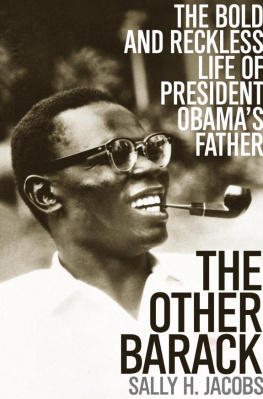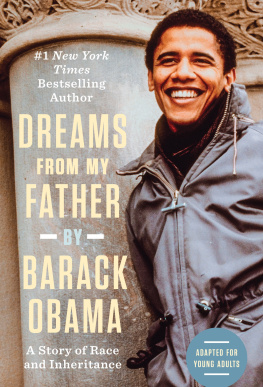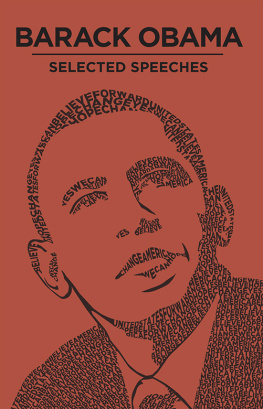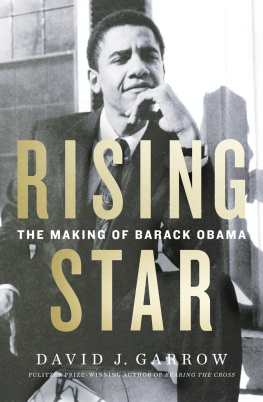Table of Contents
For
Streett and Shi Shi
Whom I love
PREFACE
Every man who has served as the president of the United States had parents who lived out their lives upon American soil.
Barack H. Obama did not. That fact has lent the president with the singular name both a hint of the exotic andas his critics see ita whiff of something decidedly un-American. The blood that makes Obama black flows from a place that is distinctly Other. His father, the other Barack H. Obama, did not come from somewhere known to most Americans, like England or Canadaplaces where the habits and manners are akin to that of America. Although several of the parents of early presidents were born in England or Ireland, they soon made their way across the channel and built their homes here. But Obamas paternal roots lie in far away Africa, specifically in the western region of Kenya that is populated by an ethnic group known as the Luo.
In Luoland, young men on reaching puberty routinely had their bottom six teeth removed as a coming of age ritual until well into the twentieth century. Polygamy is a long-standing practice, and men routinely take multiple wives to this day. The birth of twins is considered an ominous sign. At one time such a birth prompted a runner to streak to the home of the babies grandmother, where he would secretly bury a hoe in an effort to stem the bad luck that the twins arrival occasioned.
No other American president could say that about the land of their forefathers, nor would they likely brandish such information even if they could. Such a dramatic reflection of foreign rootsof othernessis not exactly the kind of thing that wins the hearts and minds of voters in mainstream America.
It is partly for that reason that during Obamas determined march toward the White House in 2008 not a great deal was said about his father. Nor did the media produce a much more detailed portrait. At the time, his fathers story was not easy to get, for the first Barack Obama had lived a disorganized life, one of fractured pieces that seemed to have little connective tissue. When he died in a car accident one night in 1982, even those close to him struggled to understand the chaotic forces that contributed to his end.
I played a role in that incomplete storytelling. In October of 2008 I wrote a profile of the elder Obama for The Boston Globe , where I had been a reporter for more than two decades. I was unable to go to Kenya to report the story but instead relied on dozens of telephone interviews and the contemporary journalists tools of the tradee-mail and text messages. The story accurately reflected the arc of the elder Obamas life, but there was much I could not understand without going to Kenya and walking the rocky plains that unfurl toward Lake Victoria and where his character was so deeply rooted. And yet the shadow of this mysterious presidential candidates little-understood father riveted me. Even the candidate, who had written a memoir in large measure about the father he met only once in his life, seemed to yearn to know more about his enigmatic parent.
In the final weeks leading up to the election I resolved that if Obama made it to the White House, I would pursue the larger story. There was so much that was not known. How had Obama Sr., raised in the scrappy bush hundreds of miles from Nairobi, achieved the lofty heights that he did? With his superior intellectual abilities, why did he not get the Harvard University graduate degree for which he worked so hard and yearned so deeply? What were the deeper roots of his downfall? It was clear that his heavy consumption of alcohol played a part. Obama was given the nickname Double-Double due to his habit of ordering successive twin shots of whiskey at one sitting, sometimes accumulating up to sixteen shot glasses before him. But that there were far larger elements at play in the unfolding of his lifes journey, not all of his own making, was also obvious. I knew from my initial reporting for the Globe that the older Obamas life was an extravagant journey, one inextricably linked to the painful disappointments of Kenyas first presidency. The answers, somehow, must lie in the red dust of Luoland on the other side of the world.
I had never been to Africa before nor did I want to go in the slightest. Eight years earlier a young relative of mine died in a brutal accident in a game park in Botswana. Africa was the absolute last place in the world I wanted to venture. And yet questions about the likely next presidents father continued to nag at me. Who he was and how the force of his personality had shaped his second son, even in his absence, seemed to be critical elements in the unfolding presidential drama. If Obama were to become president, his largely unknown father lay at the core of a seismic event that would bear upon developments around the globe for years and, perhaps, even generations to come. I wanted to tell his story. Perhaps in going to Africa I could also find some deeper understanding of what had led to my familys personal tragedy as well.
In December of 2008, one month after Obama won the election, I was on my way to the suburban town of Bracknell, west of London, to talk with Obamas Sr.s first wife, Grace Kezia. In her small apartment I heard my first words of Dholuo, the language of the Luo tribe, as she recounted for me how she met the new American presidents father at a Christmas dance more than a half-century ago. She showed me photographs of family gatherings at which the younger Obama had posed with half a dozen of his relatives wearing vivid African dressthe kind of pictures that had not figured remotely in the presidential campaign. That visit was the first step in a long journey that took me to Hawaii, remote parts of the United States, and Kenya time and again. By the end I had traveled seventy-five thousand miles. I had spent days talking with dozens of Obamas in the village of Kanyadhiang, where the first Barack was born, and on one memorable night I watched with them as a furious storm churned its way up from Lake Victoria and lashed its wet fury upon their thatched-roof homes. I had also broken two ribs, contracted salmonella poisoning from a buffet in an elegant Nairobi hotel, and endured two bouts of pneumonia. I had driven the torturous roads to countless remote homesteads bearing rolls of barbed wire, machetes, and sacks of sugar, which were my gifts for those generous enough to take their time from work to share their memories with me. On one of my last visits to Kanyadhiang, the goat I had brought in the trunk of the carthe mode of transport for many an unlucky goat in Africawas christened Sally in my honor. She was slaughtered shortly afterwardas is the fate of many an unlucky goat in Africa.
Not all Obamas were glad to see me. When the first Barack Obama died, he left behind a chaotic domestic tangle and a darkly checkered career. Some family members did not want his lifes story told. But if it was going to be told, they wanted one of their own to do it. The last person they wanted writing about Obamas life was a mzungu (Swahili for a white person) from the United States. Several months after I started work on the book one Obama family member launched an e-mail campaign against the project, declaring that I was a Republican collaborator bent on bringing the president down and preventing him from running for another term. In the fall of 2009 Obama family members living near Kisumu, the principal city in western Kenya, received a flurry of such e-mails, and the e-mails impact was chilling. There is no electricity in the village, which lies not far from Lake Victoria, but there are many cell phones, so the word traveled fast. By the following spring, when my car bounced down the rocky dirt road leading to the village, the reception was decidedly cool. Ironically, the barrage of e-mails was launched from Boston, Massachusetts, a little over one mile from my office at the Boston Globe.






